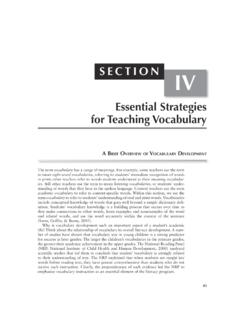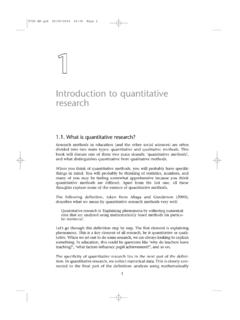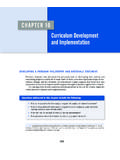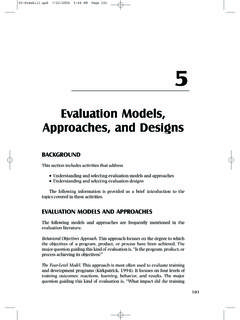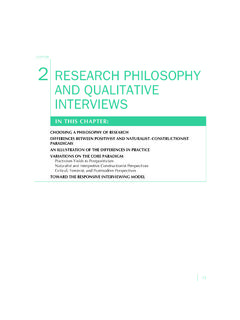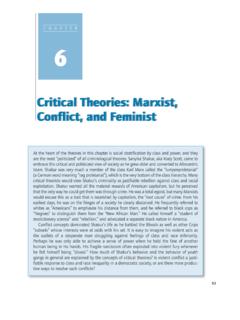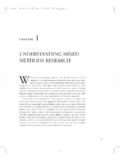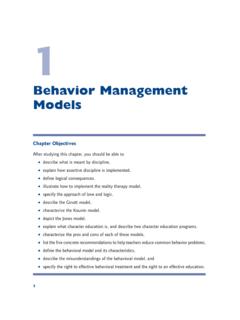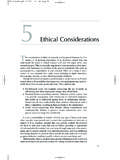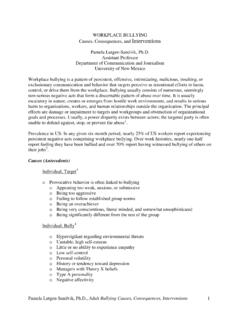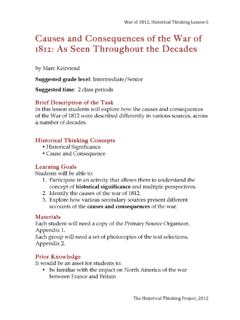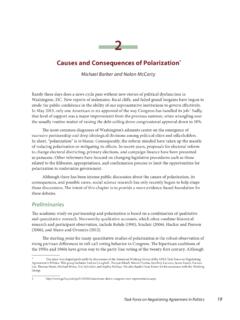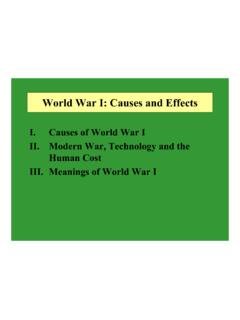Transcription of Causes and Consequences of Racial Prejudice
1 3 Causes and Consequencesof Racial PrejudiceDeep rooted prejudices entertained by the whites; ten thousandrecollections, by the blacks, of the injuries they have sustained;new provocations; the real distinctions which nature has made;and many other circumstances, will divide us into parties, andproduce convulsions which will probably never end but in theextermination of the one or the other race. Thomas Jefferson,Notes on Virginia(as cited in Jordan, 1968, p. 436)The deleterious effect of Prejudice and racism on African Americans andother ethnic minority groups is well documented. A number of scholarshave built long and illustrious careers delineating the exact mechanismsby which racism diminishes the quality of life experienced by AfricanAmericans and other Racial and ethnic minorities living in the United Statesand elsewhere ( , Gordon Allport, Na im Akbar, Philomena Essed, JoeFeagin, Franz Fanon, James Jackson, James Jones).
2 In contrast, little evi-dence, empirical or otherwise, exists regarding the negative consequencesof racism for White Americans. The lack of attention given to understand-ing how racism affects the lives of White Americans is due to the com-monly held belief that it is an issue germane only to people of color. Thisfallacy has been perpetuated by research scientists, educators, politicians,policy makers, and, to some degree, well-intentioned civil rights leadersand organizations. Moreover, and to a greater degree, the privilege ofWhiteness allows persons so classified to be oblivious to racism and itsdeleterious effects (see McIntosh, 1988, 1998; Neville et al.)
3 , 2001).4103-Ponterotto 3/2/2006 9:51 AM Page 41 There is little doubt as to how insidious racism is and that it permeatesevery facet of American life. Intuitively, we know that racism is harmful forboth the victims and perpetrators and that eliminating it from our societywould be in everyone s interest. However, a number of scholars ( ,D Andrea & Daniels, 2001; Helms, 1984) have suggested that only whenWhites are convinced that racism is detrimental to their own quality of lifeand accept responsibility for its elimination can we expect to eradicate itfrom our society. This chapter will make the case that racism is not only abad thing for African Americans and other minority group members but thatit negatively affects the quality of life and psychological well-being ofWhite would like the reader to note that the focus of this chapter is Whiteracism.
4 Some might argue that members of other Racial and ethnic groups canbe racist and to focus on only Whites is in and of itself a form of racism. Herewe would direct the reader back to Chapter 1, where we define racism anddistinguish it from Prejudice and discrimination. True, anyone can be a bigotand harbor hatred based on race, ethnicity, national origin, sexual orientation,and related demographics. These behaviors, though reprehensible, do notconstitute racism. The focus on White racism,however, is not based on thesedistinctions but is used for historical accuracy and conceptual clarity. Whiteracism is the progenitor of all the other forms of racism that pervade thesocial and cultural fabric of society.
5 To begin this discussion anywhereelse would be current chapter will address several areas pertinent to the deleteri-ous effects of racism on both Black and White Americans. First, we discussthe psychological mechanisms responsible for the development and main-tenance of Racial animosity. Particular attention is given to unconsciouspsychological processes and how they protect the ego from the threat, bothreal and imagined, ignited by anxiety related to Racial fantasies. Second, weexamine the deleterious effects of racism on the mental health of Whites;particular attention is given to reviewing recent empirical evidence on thetopic.
6 In the next section, we devote space to a discussion of the negativeconsequences of racism on the quality of life and general well-being ofAfrican Americans. We conclude with a summary of the and White AmericansPsychological Mechanisms of White RacismWhite PrivilegeWhite privilege, according to McIntosh (1988, 1998), is a meanswhereby Whites achieve societal rewards based on skin color and other42 Prejudice AND RACISM03-Ponterotto 3/2/2006 9:51 AM Page 42socially determined indicators of race rather than on merit. White privilegeis based on the assumption that Whiteness confers powers, both real andimagined, on the beholder that are not available to people of color (Nevilleet al.)
7 , 2001). McIntosh posits that there are two types of White privilege:(a) unearned entitlementsand (b) conferred entitle-ments refer to things that all people should enjoy ( , feeling safe in publicspaces, being valued for what one contributes, working in a place whereone feels one belongs) but that are restricted to Whites and result inunearned is this unearned advantage that results in a compet-itive edge that most Whites are unwilling to admit to, let alone other form of privilege, conferred dominance, goes even further by giv-ing individuals classified as White power over individuals classified as non-White.
8 For example, the second author (S. O. Utsey), an African Americanmale, was once questioned about his presence in a predominantly Whitecommunity by an ordinary citizen who felt empowered to do racism, White privilege is maintained and reinforced via culturalsymbols that perpetuate the superiority of Whites and the inferiority of allother Racial groups. As a result, White privilege has become institutional-ized, permeating virtually all aspects of American life. Neville et al. (2001)suggest that White privilege is a multidimensional phenomena occurringat both macro and micro levels. Macrolevel White privilege is systemic innature and manifests itself in the benefits, rights, and immunities affordedWhites in institutional settings in the United States.
9 For example, in timesof economic hardship, the first-hired-last-fired policy practiced by corporations tends to benefit Whites because Blacks and other peopleof color, due to historical discrimination in hiring, tend to be the last hiredand therefore the first to be fired. Microlevel White privilege is character-ized by the individual and group advantages that Whites enjoy. Accordingto Neville et al., advantages at the microlevel of White privilege are pri-marily intrapsychic and interpersonal ( , sense of entitlement, social val-idation of Whiteness). What makes White privilege so insidious is that it isinvisible, omnipresent, and unacknowledged by its Racial AttitudesThe concept of colorblind Racial attitudes was first introduced in Chapter was noted, racism is less an individual-level psychological attitude than itis a social, cultural, and institutional phenomenon (Neville et al.)
10 , 2001). Assuch, Neville et al. (2001) posited that colorblind Racial attitudes (CoBRA)were an attempt to deny and distort the reality of race and racism in the livesof people of color. In this context, CoBRA are viewed as a more modern formof racism, distinguishable from old-fashioned racism and bigotry. Expressionsof CoBRA are characterized by negative stereotyping, blaming the victim (assuming that people of color are to blame for their own Racial victimization), Causes and Consequences of Racial Prejudice4303-Ponterotto 3/2/2006 9:51 AM Page 43and resistance to any meaningful effort to dismantle institutional barriers toracial equality.

